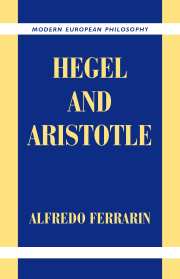Book contents
- Frontmatter
- Contents
- Acknowledgments
- List of Abbreviations
- Introduction
- PART I THE HISTORY OF PHILOSOPHY AND ITS PLACE WITHIN THE SYSTEM
- PART II LOGIC AND METAPHYSICS
- 3 The Lectures on the Metaphysics
- 4 The Aristotelian Heritage in the Science of Logic
- 5 Aristotelian Questions
- 6 Essence and Concept
- PART III ARISTOTLE AND THE REALPHILOSOPHIE
- PART IV CONCLUSIONS
- Bibliography
- Index
3 - The Lectures on the Metaphysics
Published online by Cambridge University Press: 22 October 2009
- Frontmatter
- Contents
- Acknowledgments
- List of Abbreviations
- Introduction
- PART I THE HISTORY OF PHILOSOPHY AND ITS PLACE WITHIN THE SYSTEM
- PART II LOGIC AND METAPHYSICS
- 3 The Lectures on the Metaphysics
- 4 The Aristotelian Heritage in the Science of Logic
- 5 Aristotelian Questions
- 6 Essence and Concept
- PART III ARISTOTLE AND THE REALPHILOSOPHIE
- PART IV CONCLUSIONS
- Bibliography
- Index
Summary
he could plunge back into his chaos and drag out of it, with all its wet stars, his cosmos
(V. Nabokov, Pale Fire)Fue como un dios que creara el cosmos y luego el caos.
(J. L. Borges, El Aleph)Being and Becoming
For Hegel the Metaphysics expresses the speculative idea (VGPh 151–2, HP 137), especially in book Λ where Aristotle speaks of divine thought. Hegel prefaces his exposition by recalling how Aristotle, even though he had no system, wrote that divinity cannot be jealous (Met. A 2, 983a 2–3). For Hegel this means that God communicates essence to the world (VGPh 150, HP 135–6; J/G 67). God and the world, reason and nature, do not fall asunder.
He proceeds to his analysis and begins by quoting Γ 1. First philosophy is the “science of that which is insofar as it is and what belongs to it in and for itself.” In Z 1, Hegel continues, Aristotle determines being more precisely as ousia. “In this ontology, or, as we call it, logic, Aristotle investigates and distinguishes four principles: (1.) the determinacy or quality as such through which something is a this; (2.) matter (hulê); (3.) the principle of motion (Bewegung); and (4.) the principle of the end or the Good (1, 3)” (ibid.). It seems clear that in Hegel's mind the four principles are Aristotle's four causes, and that these are expounded in the books on which he will mostly concentrate, Z, H, Θ, and Λ.
Information
- Type
- Chapter
- Information
- Hegel and Aristotle , pp. 105 - 128Publisher: Cambridge University PressPrint publication year: 2001
